Listening
Unit1__Listening参考教案
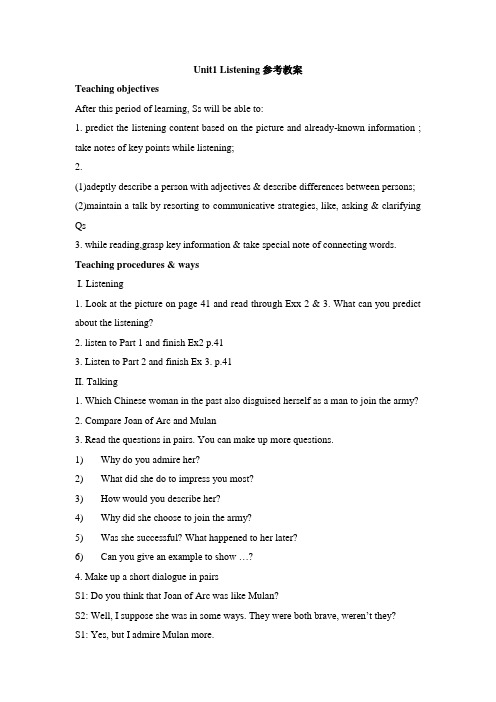
Unit1 Listening参考教案Teaching objectivesAfter this period of learning, Ss will be able to:1. predict the listening content based on the picture and already-known information ; take notes of key points while listening;2.(1)adeptly describe a person with adjectives & describe differences between persons;(2)maintain a talk by resorting to communicative strategies, like, asking & clarifying Qs3. while reading,grasp key information & take special note of connecting words. Teaching procedures & waysI. Listening1. Look at the picture on page 41 and read through Exx 2 & 3. What can you predict about the listening?2. listen to Part 1 and finish Ex2 p.413. Listen to Part 2 and finish Ex 3. p.41II. Talking1. Which Chinese woman in the past also disguised herself as a man to join the army?2. Compare Joan of Arc and Mulan3. Read the questions in pairs. You can make up more questions.1) Why do you admire her?2) What did she do to impress you most?3) How would you describe her?4) Why did she choose to join the army?5) Was she successful? What happened to her later?6) Can you give an example to show …?4. Make up a short dialogue in pairsS1: Do you think that Joan of Arc was like Mulan?S2: Well, I suppose she was in some w ays. They were both brave, weren’t they?S1: Yes, but I admire Mulan more.S2: What did she do to impress you?S1: …III. Listening Task p441. Before Listening. T: We are going to listen to a dialogue between Ding Lingyu and Ms Jody Williams about the la tter’s work to ban landmines.1)What does ICBL mean?2)Why are landmines dangerous? What can landmines do to people?2. Listen to Part 1 carefully and take notes. Fill in the chart in Ex2 p443. Listen to Part 2 and fill in the blanks. Ex3 p44IV. Reading Task p441. What do you know about Elizabeth Fry from Warming-up?A Quaker // Helped improve prison conditions and gave prisoners work and education //Helped the Quakers get the Nobel Peace Prize in 19472. Skim the reading about Elizabeth in five minutes and finish Ex 1. p44V. Homework1. Remember all the new words and phrases in Unit 1.2. Finish Exercise 2 on page 45.3. Think about a special woman you admire and look for some information about her. Reflection:。
listen动名词形式

listen动名词形式
listen动名词形式:listening。
listen的名词形式:listener,作名词时译为“听者,认真倾听的人;收听广播节目的人”。
名词是词类的一种,属于实词。
它表示人、事、物、地点或抽象概念的统一名称。
它分为专有名词和普通名词。
短语搭配:Channel Listener信道监听器、之三信道监听器、entertainment listener休闲型听者。
listen的ing形式,listen的人称和时态变化,第三人称单数:listens;现在分词:listening;过去式:listened;过去分词:listened。
一般动词的动名词形式都是在动词词尾加“ing”。
动词的+ing形式具有动词的特征,具有名词、形容词和副词的特征,因此它可以在句中作主语、表语、定语、宾语、宾语补足语和状语。
在英语中,名词的格有3种:主格、宾格、所有格。
其中个体名词表示某类人或东西中的个体;集体名词表示若干个个体组成的集合体;物质名词表示无法分为个体的实物;抽象名词表示动作、状态、品质、感情等抽象概念。
对于普通名词来说,可分为可数名词和不可数名词。
listening应试技巧
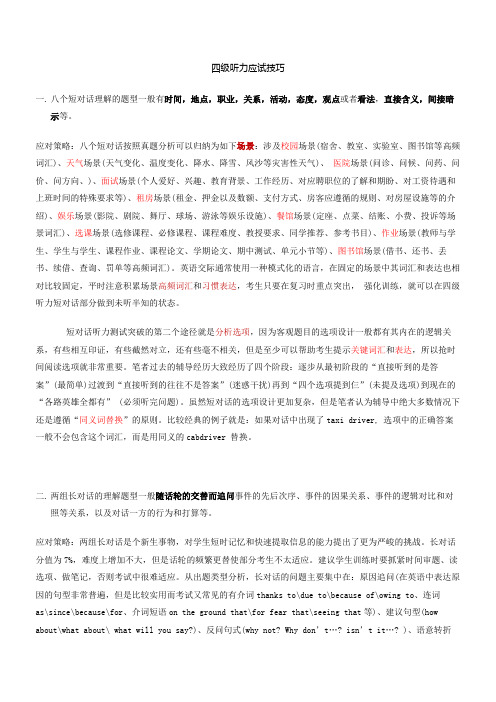
四级听力应试技巧一. 八个短对话理解的题型一般有时间,地点,职业,关系,活动,态度,观点或者看法,直接含义,间接暗示等。
应对策略:八个短对话按照真题分析可以归纳为如下场景:涉及校园场景(宿舍、教室、实验室、图书馆等高频词汇)、天气场景(天气变化、温度变化、降水、降雪、风沙等灾害性天气)、医院场景(问诊、问候、问药、问价、问方向、)、面试场景(个人爱好、兴趣、教育背景、工作经历、对应聘职位的了解和期盼、对工资待遇和上班时间的特殊要求等)、租房场景(租金、押金以及数额、支付方式、房客应遵循的规则、对房屋设施等的介绍)、娱乐场景(影院、剧院、舞厅、球场、游泳等娱乐设施)、餐馆场景(定座、点菜、结账、小费、投诉等场景词汇)、选课场景(选修课程、必修课程、课程难度、教授要求、同学推荐、参考书目)、作业场景(教师与学生、学生与学生、课程作业、课程论文、学期论文、期中测试、单元小节等)、图书馆场景(借书、还书、丢书、续借、查询、罚单等高频词汇)。
英语交际通常使用一种模式化的语言,在固定的场景中其词汇和表达也相对比较固定,平时注意积累场景高频词汇和习惯表达,考生只要在复习时重点突出,强化训练,就可以在四级听力短对话部分做到未听半知的状态。
短对话听力测试突破的第二个途径就是分析选项,因为客观题目的选项设计一般都有其内在的逻辑关系,有些相互印证,有些截然对立,还有些毫不相关,但是至少可以帮助考生提示关键词汇和表达,所以抢时间阅读选项就非常重要。
笔者过去的辅导经历大致经历了四个阶段:逐步从最初阶段的“直接听到的是答案”(最简单)过渡到“直接听到的往往不是答案”(迷惑干扰)再到“四个选项提到仨”(未提及选项)到现在的“各路英雄全都有” (必须听完问题)。
虽然短对话的选项设计更加复杂,但是笔者认为辅导中绝大多数情况下还是遵循“同义词替换”的原则。
比较经典的例子就是:如果对话中出现了taxi driver, 选项中的正确答案一般不会包含这个词汇,而是用同义的cabdriver 替换。
listen的第三人称单数和现在分词
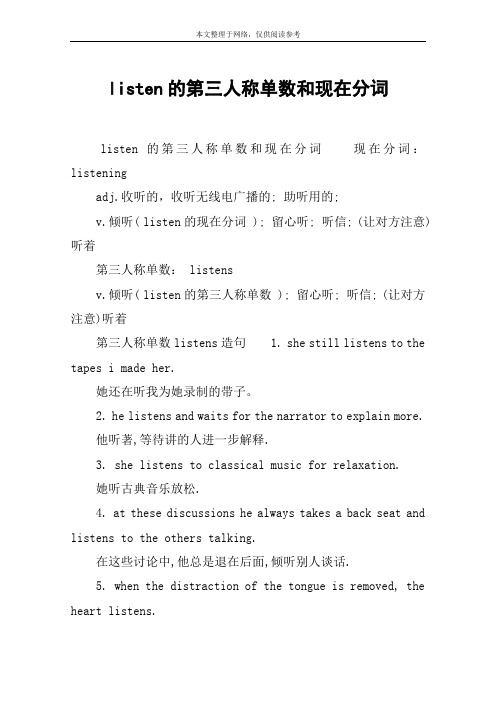
listen的第三人称单数和现在分词listen的第三人称单数和现在分词现在分词:listeningadj.收听的,收听无线电广播的; 助听用的;v.倾听( listen的现在分词 ); 留心听; 听信; (让对方注意)听着第三人称单数: listensv.倾听( listen的第三人称单数 ); 留心听; 听信; (让对方注意)听着第三人称单数listens造句 1. she still listens to the tapes i made her.她还在听我为她录制的带子。
2. he listens and waits for the narrator to explain more.他听著,等待讲的人进一步解释.3. she listens to classical music for relaxation.她听古典音乐放松.4. at these discussions he always takes a back seat and listens to the others talking.在这些讨论中,他总是退在后面,倾听别人谈话.5. when the distraction of the tongue is removed, the heart listens.舌头只会让人分心,只有舌头停止说话, 心灵才能听见另一颗心声.6. he listens to the radio while driving to work.他去上班一边开着车一边听音乐.7. he listens to what people say, and he tries to guess what he hears.他先听别人是怎么说的, 再试着去猜听到的是什么.8. it listens to what people say and it tries to imitate what it heard.他听到人们谈话便试着模仿所听到的内容.9. every day she listens to english over the radio in order to improve her pronunciation.她每天听英语广播,为了提高英语发音水平.10. her face is impassive as she listens to miller dictating the warrant for her arrest.她毫无表情地在听米勒口述拘留她的证书.listen的常见用法用作动词用作不及物动词s+~(+a)he listened, but could hear nothing.他侧耳静听,但什么声音也听不见。
unit1《listening》课件十一(22张PPT)(人教版必修4)

to have children. Most of the childcare and running the house is the concern of the mother. Men do not have this pressure. They can work long hours and go on business trips. They can improve their _c_a_r_e_e_r__chances while knowing that the family is cared for at home.
The church thought Joan had not behaved as a woman should.
3. Why did France not win a war against the
English before Joan became a soldier? They did not have leaders to inspire them or who had good ideas for winning battles. 4. Why did Joan help the French army to
Listening on page 41
1. Why did Joan have to dress up as a man to become a soldier?
Because at that time women were not allowed to be soldiers.
2. Why did the Church not like Joan acting as a man?
home for family reasons, while more boys_c_o_n_t_i_n_u_e_t_h_e_ir__s_tu_d_i_e_s__. This prevents girls from training for their chosen career.
Unit1_Listening优秀教案
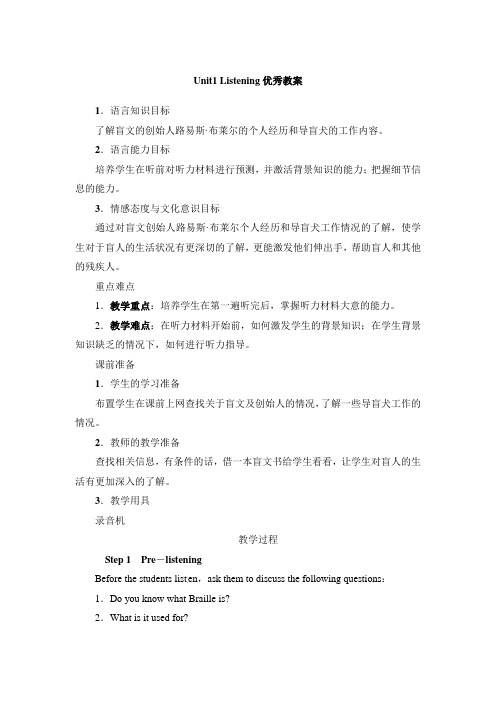
Unit1 Listening优秀教案1.语言知识目标了解盲文的创始人路易斯·布莱尔的个人经历和导盲犬的工作内容。
2.语言能力目标培养学生在听前对听力材料进行预测,并激活背景知识的能力;把握细节信息的能力。
3.情感态度与文化意识目标通过对盲文创始人路易斯·布莱尔个人经历和导盲犬工作情况的了解,使学生对于盲人的生活状况有更深切的了解,更能激发他们伸出手,帮助盲人和其他的残疾人。
重点难点1.教学重点:培养学生在第一遍听完后,掌握听力材料大意的能力。
2.教学难点:在听力材料开始前,如何激发学生的背景知识;在学生背景知识缺乏的情况下,如何进行听力指导。
课前准备1.学生的学习准备布置学生在课前上网查找关于盲文及创始人的情况,了解一些导盲犬工作的情况。
2.教师的教学准备查找相关信息,有条件的话,借一本盲文书给学生看看,让学生对盲人的生活有更加深入的了解。
3.教学用具录音机教学过程Pre-listeningBefore the students list en,ask them to discuss the following questions:1.Do you know what Braille is?2.What is it used for?3.How does it work?4.Do you know what the Chinese system of Braille looks like?(See Page 53 for some hints.)Suggested answers:Braille is a system by which blind people can read by feeling raised dots on a page. Both English and Chinese system of Braille use six dots. Their forms are similar,but their meanings are different. That's to say,Chinese blind people can't understand the English system of Braille.[设计说明]在听力训练正式开始前,在班级里组织讨论,激活学生的背景知识,有利于随后进行的关于盲文创始人路易斯·布莱尔的生平介绍的听力训练顺利展开。
listeningto的用法
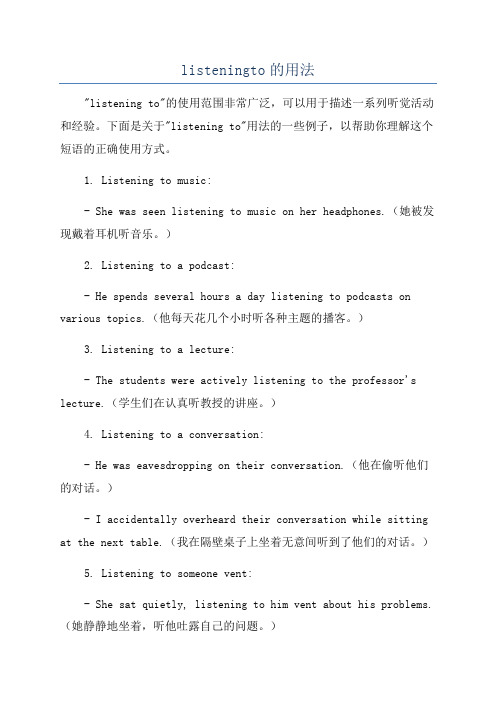
listeningto的用法"listening to"的使用范围非常广泛,可以用于描述一系列听觉活动和经验。
下面是关于"listening to"用法的一些例子,以帮助你理解这个短语的正确使用方式。
1. Listening to music:- She was seen listening to music on her headphones.(她被发现戴着耳机听音乐。
)2. Listening to a podcast:- He spends several hours a day listening to podcasts on various topics.(他每天花几个小时听各种主题的播客。
)3. Listening to a lecture:- The students were actively listening to the professor's lecture.(学生们在认真听教授的讲座。
)4. Listening to a conversation:- He was eavesdropping on their conversation.(他在偷听他们的对话。
)- I accidentally overheard their conversation while sitting at the next table.(我在隔壁桌子上坐着无意间听到了他们的对话。
)5. Listening to someone vent:- She sat quietly, listening to him vent about his problems.(她静静地坐着,听他吐露自己的问题。
)- I appreciate that you always listen to me when I need to vent.(感谢你在我需要宣泄时一直倾听我。
listeningto的用法
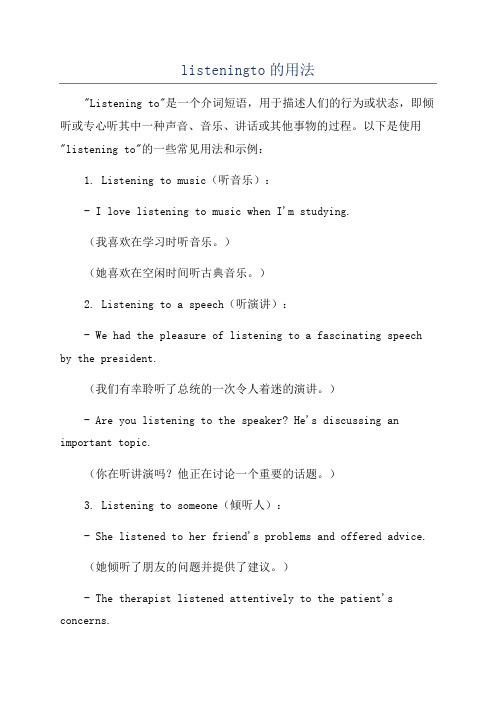
listeningto的用法"Listening to"是一个介词短语,用于描述人们的行为或状态,即倾听或专心听其中一种声音、音乐、讲话或其他事物的过程。
以下是使用"listening to"的一些常见用法和示例:1. Listening to music(听音乐):- I love listening to music when I'm studying.(我喜欢在学习时听音乐。
)(她喜欢在空闲时间听古典音乐。
)2. Listening to a speech(听演讲):- We had the pleasure of listening to a fascinating speech by the president.(我们有幸聆听了总统的一次令人着迷的演讲。
)- Are you listening to the speaker? He's discussing an important topic.(你在听讲演吗?他正在讨论一个重要的话题。
)3. Listening to someone(倾听人):- She listened to her friend's problems and offered advice.(她倾听了朋友的问题并提供了建议。
)- The therapist listened attentively to the patient's concerns.(治疗师专心听取了病人的关切。
)4. Listening to nature(倾听大自然):- Sitting by the lake, she enjoyed listening to the peaceful sounds of nature.(坐在湖边,她享受着听着大自然的和平声音。
)- The hiker paused for a moment to listen to the birds singing in the trees.(徒步旅行者停下脚步,聆听树上鸟儿的歌声。
listening的英文作文

listening的英文作文Title: The Art of Listening。
Listening is an art, often overlooked in the cacophony of modern life. In a world inundated with distractions, genuine listening has become a rare skill. However, its importance cannot be overstated. Effective listening fosters understanding, empathy, and meaningful connections between individuals. In this essay, we delve into the significance of listening and explore strategies to become better listeners.Firstly, let us acknowledge the power of listening. When we truly listen to others, we validate their experiences and emotions. Through attentive listening, we create a safe space for individuals to express themselves without fear of judgment. This fosters trust and strengthens relationships, be it in personal or professional settings.Furthermore, listening cultivates empathy. By actively tuning in to someone's words, tone, and body language, we gain insights into their perspective and emotions. This understanding forms the foundation for empathy, enabling us to relate to others' experiences and respond with compassion. In a world grappling with social divides and conflicts, empathetic listening serves as a bridge that connects diverse communities.Moreover, listening is crucial for effective communication. Too often, conversations devolve into mere exchanges of words, with little genuine understanding. However, when we listen with intent, we grasp not only the surface content but also the underlying meanings and nuances. This comprehensive understanding allows for more meaningful exchanges and prevents misunderstandings.So, how can we become better listeners? The journey towards becoming a skilled listener begins with mindfulness. In a world abuzz with distractions, it's essential to cultivate present-moment awareness. When engaged in a conversation, strive to silence internal chatter and focusentirely on the speaker. This practice of mindfulness enhances our capacity to listen deeply.Active listening is another cornerstone of effective communication. This involves not only hearing the words spoken but also interpreting their meaning and context. Maintain eye contact, nod in acknowledgment, and offerverbal affirmations to signal your attentiveness. Paraphrasing what you've heard also demonstrates your commitment to understanding the speaker's message.Furthermore, nonverbal cues play a pivotal role in communication. Pay attention to the speaker's body language, facial expressions, and tone of voice. These cues often convey emotions and sentiments that words alone cannot express. By attuning ourselves to nonverbal signals, wegain a more comprehensive understanding of the speaker's message.In addition to these strategies, fostering a mindset of curiosity can enhance our listening skills. Approach every conversation with a genuine desire to learn from the otherperson. Ask open-ended questions that invite deeper exploration and encourage the speaker to elaborate on their thoughts and feelings. By demonstrating curiosity, wesignal our respect for the speaker's perspective and enrich the dialogue.In conclusion, listening is a transformative skill that enriches our personal and professional lives. By listening attentively, we validate others' experiences, cultivate empathy, and foster meaningful connections. Through mindfulness, active listening, and curiosity, we can hone our listening skills and become catalysts for positive change in our communities. As we embrace the art of listening, let us strive to create a world where every voice is heard and valued.。
Listening1-课件

利用图像和图表
将听力内容与图像和图表相结合,以增强理解和记忆。
使用预测和推断技巧
根据已知信息预测和推断未知信息,以提高听力理解能力。
反思和评估听力理解
反思听力过程
在每次听力练习后,反思自己在 听力过程中的表现,总结经验和
不足。
评估理解程度
通过回答问题、复述听力和总结大 意等方式,评估自己的听力理解程 度。
与电影类似,英语电视剧也是提高听力和口语能力的有效途径。
英语播客
播客是一种可以下载后随时收听的音频节目,适合在路上或休息 时间收听,提高听力水平。
英语新闻和广播节目
英语新闻
通过收听英语新闻,学习者可以了解 国际时事、社会动态等,同时提高听 力水平。
英语广播节目
英语广播节目通常具有娱乐性和教育 性,适合不同年龄段的学习者收听。
制定长期和短期计划
定期评估和调整计划
根据学生的实际情况,制定长期和短 期的听力学习计划,明确学习目标和 时间安排。
定期评估学生的听力进展,根据评估 结果调整学习计划和目标。
设定具体目标
设定具体的听力目标,如提高听力速 度、增强听力理解能力等,以便有针 对性地进行训练。
使用辅助工具和技巧
使用字幕和笔记
听力理解不仅包括对声音的物理属性的感知,如音高、音强、音长等,还包括对语 言、语调、节奏等语言属性的理解。
听力理解是语言交际能力的重要组成部分,是人们获取信息、交流思想的重要手段 。
听力理解的过程
01
02
03
感知阶段
个体通过听觉器官接收声 音信息,并对声音进行初 步的物理属性感知。
解析阶段
大脑对接收到的声音信息 进行分析,识别和理解语 言的语法、语义和语用信 息。
listening是什么意思中文
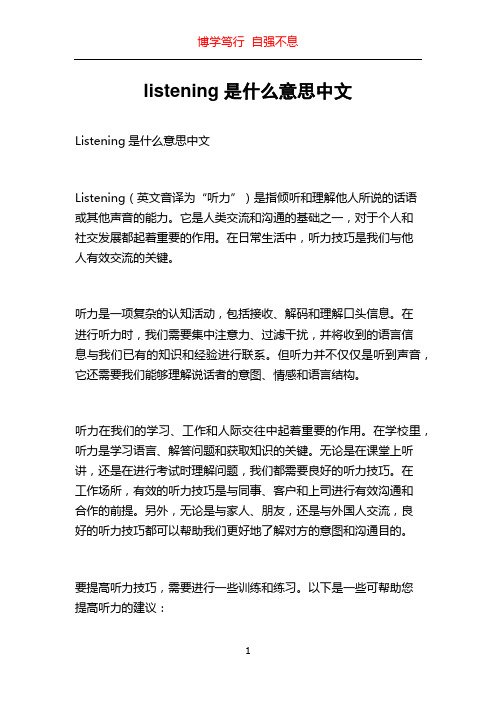
listening是什么意思中文Listening是什么意思中文Listening(英文音译为“听力”)是指倾听和理解他人所说的话语或其他声音的能力。
它是人类交流和沟通的基础之一,对于个人和社交发展都起着重要的作用。
在日常生活中,听力技巧是我们与他人有效交流的关键。
听力是一项复杂的认知活动,包括接收、解码和理解口头信息。
在进行听力时,我们需要集中注意力、过滤干扰,并将收到的语言信息与我们已有的知识和经验进行联系。
但听力并不仅仅是听到声音,它还需要我们能够理解说话者的意图、情感和语言结构。
听力在我们的学习、工作和人际交往中起着重要的作用。
在学校里,听力是学习语言、解答问题和获取知识的关键。
无论是在课堂上听讲,还是在进行考试时理解问题,我们都需要良好的听力技巧。
在工作场所,有效的听力技巧是与同事、客户和上司进行有效沟通和合作的前提。
另外,无论是与家人、朋友,还是与外国人交流,良好的听力技巧都可以帮助我们更好地了解对方的意图和沟通目的。
要提高听力技巧,需要进行一些训练和练习。
以下是一些可帮助您提高听力的建议:1. 练习聆听不同类型的材料:选择不同的语言和语速的音频或视频素材来进行聆听。
例如,您可以尝试听英语、法语、西班牙语或其他语言的新闻广播、听力练习或讲座。
2. 建立良好的听力习惯:每天抽出一段时间专门用于聆听和训练听力。
可以通过听音乐、播客、有声书或语言学习材料来进行练习。
3. 学习与声音相关的语言特征:认识不同语言之间的语音差异和语音特征,例如发音、重音、音调和语速等。
这将帮助您更好地理解和区分语音。
4. 注意和集中注意力:当进行聆听时,确保自己处于一个安静的环境中,并尽可能减少干扰。
集中注意力并聚焦于所听内容,同时尝试抓住关键词和信息。
5. 学习推测和上下文理解:除了依靠直接听到的信息,还可以通过推测、预测和根据上下文来理解和推测说话者的意图和意思。
这可以通过关注语境、情感和非语言线索来实现。
Listening
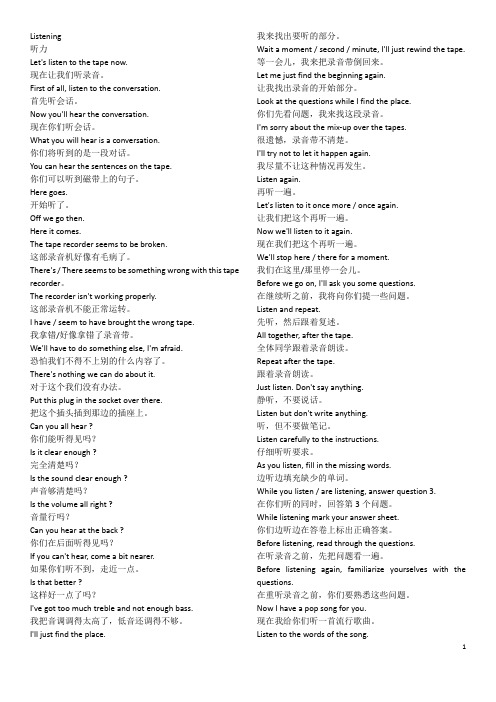
Listening听力Let's listen to the tape now.现在让我们听录音。
First of all, listen to the conversation.首先听会话。
Now you'll hear the conversation.现在你们听会话。
What you will hear is a conversation.你们将听到的是一段对话。
You can hear the sentences on the tape.你们可以听到磁带上的句子。
Here goes.开始听了。
Off we go then.Here it comes.The tape recorder seems to be broken.这部录音机好像有毛病了。
There's / There seems to be something wrong with this tape recorder。
The recorder isn't working properly.这部录音机不能正常运转。
I have / seem to have brought the wrong tape.我拿错/好像拿错了录音带。
We'll have to do something else, I'm afraid.恐怕我们不得不上别的什么内容了。
There's nothing we can do about it.对于这个我们没有办法。
Put this plug in the socket over there.把这个插头插到那边的插座上。
Can you all hear ?你们能听得见吗?Is it clear enough ?完全清楚吗?Is the sound clear enough ?声音够清楚吗?Is the volume all right ?音量行吗?Can you hear at the back ?你们在后面听得见吗?If you can't hear, come a bit nearer.如果你们听不到,走近一点。
listen的ing形式
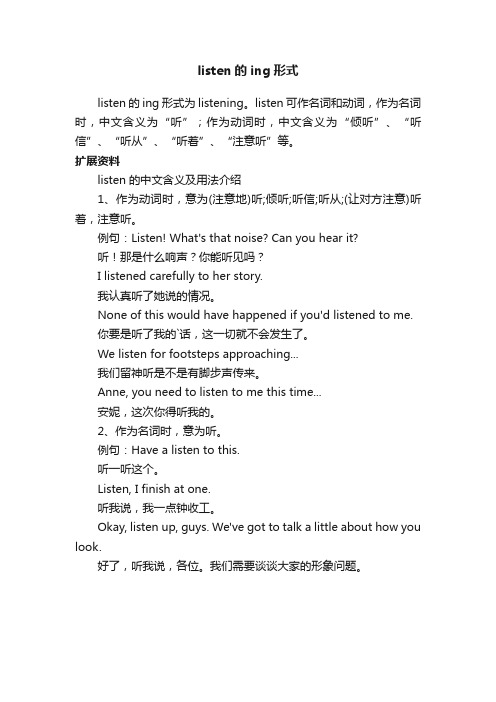
listen的ing形式
listen的ing形式为listening。
listen可作名词和动词,作为名词时,中文含义为“听”;作为动词时,中文含义为“倾听”、“听信”、“听从”、“听着”、“注意听”等。
扩展资料
listen的中文含义及用法介绍
1、作为动词时,意为(注意地)听;倾听;听信;听从;(让对方注意)听着,注意听。
例句:Listen! What's that noise? Can you hear it?
听!那是什么响声?你能听见吗?
I listened carefully to her story.
我认真听了她说的情况。
None of this would have happened if you'd listened to me.
你要是听了我的`话,这一切就不会发生了。
We listen for footsteps approaching...
我们留神听是不是有脚步声传来。
Anne, you need to listen to me this time...
安妮,这次你得听我的。
2、作为名词时,意为听。
例句:Have a listen to this.
听一听这个。
Listen, I finish at one.
听我说,我一点钟收工。
Okay, listen up, guys. We've got to talk a little about how you look.
好了,听我说,各位。
我们需要谈谈大家的形象问题。
listen的现在分词不双写n

listen的现在分词不双写nlisten的现在分词不双写n 现在分词: listening一个辅音一个原音再加一个结尾的辅音时双写最后一个字母加ing,此处listen发音[‘lisn],字母e不发音,所以不要双写。
listening的用法adj.收听的,收听无线电广播的; 助听用的;v.倾听( listen的现在分词 ); 留心听; 听信; (让对方注意)听着1. he sat listening to the tick of the grandfather clock.他坐在那儿,听着落地式大摆钟嘀嗒作响。
2. while this conver-sation was going on, i was listening with earnest attention.这场对话进行的时候,我聚精会神地听着。
3. listening to the scratchy recording, i recognized walt whitman immediately.听到沙哑的录音,我立刻知道那是沃尔特·惠特曼。
4. people were talking to him, listening to him, taking him places.人们和他交谈、听他讲话、带他游览。
5. he kept his voice low-pitched in case someone waslistening.他把声音放低以防被人听见。
6. he stood in the doorway, listening to her quiet, regular breathing.他站在走道里,听着她那沉静而规律的呼吸声。
7. they have been listening to people's gripes, moans and praise.他们一直在倾听人们的牢骚、抱怨和表扬。
8. anybody who's listening will get the drift of what he was saying.任何一个在专心听的人都会领悟他所说的大意。
listen造句

listen造句1.Why wont you listen to reason ?(你怎么就不听劝呢?)2.I listen to the radio on the way to work.(我在上班的路上听广播。
)3.Listen to the jabber of those monkeys .你听那群猴子唧唧喳喳的叫声。
4.I told him not to go , but he just would n't listen .可他偏偏不听。
5.Her color came and went as she listened .她一面听一面脸色忽红忽白。
6.She had no idea whether anybody was listening .她不知有没有人收听。
7.The students have improved their listening .这些学生的听力提高了。
8.It's difficult to find listen in a sentence.9.Music lifted up the listening spirit .音乐净化升华了倾听它的心灵。
10.They listened to the murmur of the river .他们倾听河里潺潺的流水声。
11.I never tire of listening to classical music .我对古典音乐百听不厌。
12.Please listen while i define your duties .请听我详细说明你的职务。
13.She loves listening in to other people 's gossip . 她爱偷听别人闲谈。
14.S.behrman listened to him unmoved .斯贝尔曼不动声色地听他讲着。
15.I have listened to enough bullshit lately .近来我已经听够了废话。
- 1、下载文档前请自行甄别文档内容的完整性,平台不提供额外的编辑、内容补充、找答案等附加服务。
- 2、"仅部分预览"的文档,不可在线预览部分如存在完整性等问题,可反馈申请退款(可完整预览的文档不适用该条件!)。
- 3、如文档侵犯您的权益,请联系客服反馈,我们会尽快为您处理(人工客服工作时间:9:00-18:30)。
apples. It fell far to the side of Atlanta and she ran to get it. As she picked it up, she saw Hippomenes was in front. So she ran very fast until she ws in front again. Just then Hippomenes threw another apple over her head and far to the side. Again she stopped
Listening text
The race So the next day Hippomenes was waiting when Atlanta came out. She thought, “I don’t want this man to die.” So she said to her father, “Tell him to go away. The race will not be run today.” But Hippomenes said,
2. Why did the Greek army go to Marathon? Their city was going to be attacked, so the Greek army went to Marathon to fight their enemy.
3. Did Phidippides do what he was asked? How do you know? Phidippides did what he was asked. We know because there is a mounument to him and to the dead soldiers at Marathon. He died giving his message.
Task 1: Leading in (1) Do you know there is an event called “Marathon”? (2) Do you think there was such an event in ancient Olympics? The Marathon was a modern event that was first introduced
to pick it up, and Hippomenes went in front. When she finally caught up with Hippomenes the second time, he threw the third and last golden apple. As it flew through the air Atlanta saw it and wanted it. So she picked this one up too. By this time Hippomenes was almost at
Phidippides set off. He was very tired after all the fighting but he ran as fast as he could. As he got near Athens he began to slow down. His head was bursting and he could hardly breathe. As he got to the centre of the city, he fell to the ground. All the people rushed up to him. Phidippides opened his mouth. “ Athens is saved!”
he cried. Then he fell down dead. His story became so famous that it is remembered by the Marathon race of 26 miles, which is the distance from Marathon to Athens.
and decide whether they
are true or false. (Ex 1)
F F F T T T T
Work in pairs and discuss the answers. Listen for the first time and finish Ex. 3 & Ex. 4. The correct order: 4 -11-7 - 5 - 1- 3 -9 – 6 -10- 8 -2
Task 3: Answer the questions. 1. What was Phidippides’ job as well as running? Phidippides’ job was a soldier as well as a great runner. He fought in the Battle of Marathon against the Persians. He also sent messages miles away by running.
the end of the race. Atlanta could not catch up with him because the apples were too heavy. So Hippomenes won the race and married Atlanta. Thanks to the goddess they lived happily ever after.
Listening (P48)
Smoke signals on the Great Wall to warn of invasion.
A message in a bottle in the ocean.
A man sending a homing pigeon to its home with a message tied to its leg.
This is a story of how a man marries a princess by winning a race with a Goddess’ help.
Hippomenes was waiting when Atlanta came out. She thought, “I __________ don’t want this man ______!” So she said to her to die to go away father, “Tell him __________. The race _____________ today.” But Hippomenes will not be run said, “These are ________: She her rules _________________ who _________ than runs faster will marry the man her! Come on let’s run!” ________--
The Greeks were very worried and didn’t know what to do. They sent Phidippides to Sparta to ask for help for the battle…
Task 2: Listen to get the main idea. Phidippides sent his message miles away all by himself on foot.
This is the story of why the Marathon race is included in the Olympic Games. Once there was an ancient Greek soldier called Phidippides. He ran so fast that he was often sent on long journeys with important messages. One day the leaders of Athens realized that their city was going to be attacked. They sent
“These are her rules: she will marry the man who runs faster than her. Come on- let’s run!” When the race started Hippomenes ran fast, but Atlanta ran even faster. Soon she was in front. At once Hippomenes threw one of the golden
Listening text
PHIDIPPIDIES AND THE MARATHON In the modern Olympic Games the longest running race is called the Marathon. It gets its name from a town in Greece called Marathon which is 26 miles from Athens, the capital city of Greece.
their army to the small town of Marathon, where they fought their enemies. It was a very long and hard battle, but at last the army from Athens won. They were very happy. However, they knew that the people of Athens would be wondering what had happened. So they asked Phidippides to go to Athens and tell them the good news.
